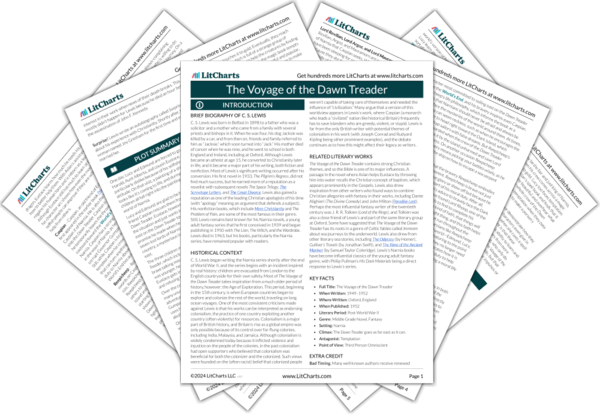Although he is not the main character, in many ways the talking mouse Reepicheep is at the center of C. S. Lewis’s The Voyage of the Dawn Treader. He is the character most committed to sailing east on the Dawn Treader to see the World’s End, and his bravery inspires even Caspian. Reepicheep’s life philosophy, which informs the book as a whole, is that Narnians should never be afraid and always be ready to face the mysteries of the world around them. At times, Reepicheep can seem reckless, such as when he encourages the Dawn Treader to head right toward the Dark Island, which threatens to trap sailors with false dreams. But Reepicheep’s boldness is rewarded when the crew of the Dawn Treader manages to make it by the island unharmed and save Lord Rhoop in the process. On another occasion Reepicheep illustrates that bravery means picking your battles wisely, as he advises the crew of the ship on how to escape a sea serpent rather than fight it.
It soon becomes clear that the bravery Reepicheep embodies has a strong ethical component. Reepicheep is brave not just because he wants to achieve glory or show off but because he believes that being brave is part of his moral duty. After all, without following Reepicheep’s advice to bravely face the Dark Island, Caspian might never have found Lord Rhoop, one of the seven lost Narnian lords he needs to find to complete his journey. Reepicheep’s bravery is a kind of faith, that things will go well for him if he just does the right thing, and this faith helps bring to life the Christian themes that run throughout the novel. By spending time with brave Narnians like Reepicheep and Caspian, the children from the real world—Edmund, Lucy, and Eustace—also learn about bravery, maturing to the point where Aslan tells Edmund and Lucy that they no longer need Narnia. The Voyage of the Dawn Treader illustrates how it is important to be brave and to have a sense of duty to help others, even in difficult situations, because living a moral life means being willing to act bravely.
Bravery ThemeTracker

Bravery Quotes in The Voyage of the Dawn Treader
Something very curious indeed had come out of the cabin in the poop and was slowly approaching them. You might call it—and indeed it was—a Mouse. But then it was a Mouse on its hind legs and stood about two feet high. A thin band of gold passed round its head under one ear and over the other and in this was stuck a long crimson feather. (As the Mouse’s fur was very dark, almost black, the effect was bold and striking.) Its left paw rested on the hilt of a sword very nearly as long as its tail. Its balance, as it paced gravely along the swaying deck, was perfect, and its manners courtly. Lucy and Edmund recognized it at once—Reepicheep, the most valiant of all the Talking Beasts of Narnia, and the Chief Mouse
Where sky and water meet,
Where the waves grow sweet,
Doubt not, Reepicheep,
To find all you seek,
There is the utter East.
At this Gumpas began to pay real attention. “Oh, that’s quite out of the question,” he said. “It is an economic impossibility—er—your Majesty must be joking.”
Others would have joined him if at that moment Reepicheep had not called out, “Don’t fight! Push!” It was so unusual for the Mouse to advise anyone not to fight that, even in that terrible moment, every eye turned to him.
It was really very dreadful because she could still see nobody at all. The whole of that park-like country still looked as quiet and empty as it had looked when they first landed. Nevertheless, only a few feet away from her, a voice spoke.
That evening all the Narnians dined upstairs with the Magician, and Lucy noticed how different the whole top floor looked now that she was no longer afraid of it. The mysterious signs on the doors were still mysterious but now looked as if they had kind and cheerful meanings, and even the bearded mirror now seemed funny rather than frightening.
“But what manner of use would it be plowing through that blackness?” asked Drinian.
“Use?” replied Reepicheep. “Use, Captain? If by use you mean filling our bellies or our purses, I confess it will be no use at all. So far as I know we did not set sail to look for things useful but to seek honor and adventure. And here is as great an adventure as ever I heard of, and here; if we turn back, no little impeachment of all our honors.”
“Because,” said the Mouse, “this is a very great adventure, and no danger seems to me so great as that of knowing when I get back to Narnia that I left a mystery behind me through fear.”
“You can’t know,” said the girl. “You can only believe—or not.”
“My son,” said the star, “it would be no use, even though you wished it, to sail for the World’s End with men unwilling or men deceived. That is not how great unenchantments are achieved. They must know where they go and why. But who is this broken man you speak of?”
“Only two more things need to be told. One is that Caspian and his men all came safely back to Ramandu’s Island. And the three lords woke from their sleep. Caspian married Ramandu’s daughter and they all reached Narnia in the end, and she became a great queen and the mother and grandmother of great kings. The other is that back in our own world everyone soon started saying how Eustace had improved, and how “You’d never know him for the same boy”: everyone except Aunt Alberta, who said he had become very commonplace and tiresome and it must have been the influence of those Pevensie children.











